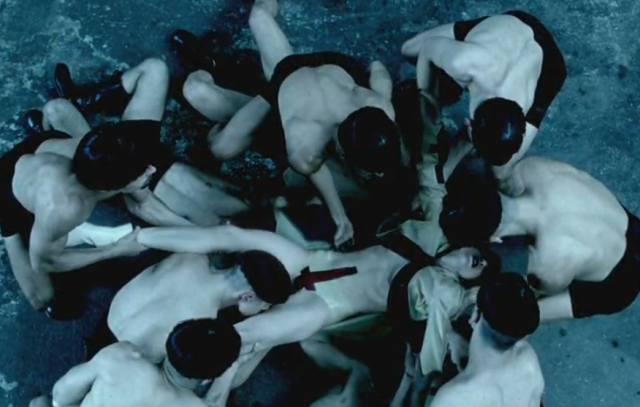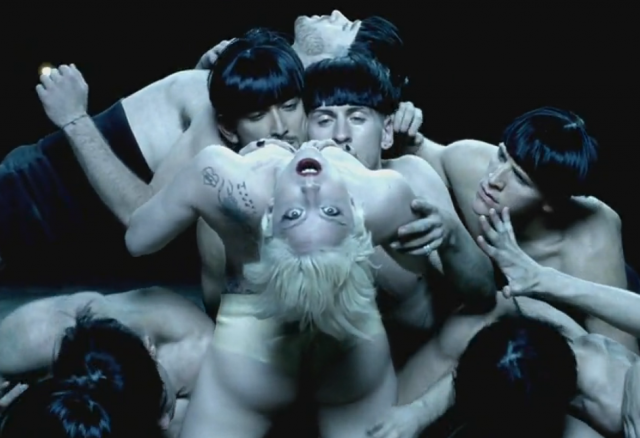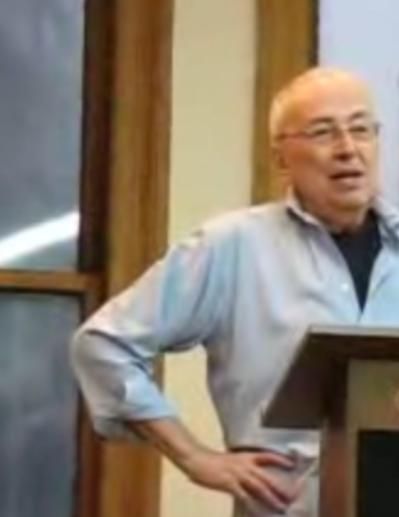Do You Know No Jews At All? Here Are 100
Jewcy has made a list of 100 Jews. Well, that should come in handy.
Plagiarism and College
This is fascinating: a professor goes back to meet a student he failed for plagiarizing. (Her plagiarism was direct and outright, copying a paper directly.) Because he thought the consequences were too extreme, and the college system too regimented (“over and over I saw how the nature of the institution and its agents reduced the complexity of student experience to neat bureaucratic decision tree”) she was the only student he ever punished for plagiarism.
"New" Neu!
Here’s an interview with Michael Rother, the surviving half of legendary Krautrock duo Neu!, which has just put out a vinyl-only box set that contains Neu! 86, a previously unreleased album. I am seriously considering buying a record player.
The 'Alejandro' Video: Lady Gaga and Failures of Pastiche

Is pastiche supposed to be coherent? I would argue that yes, it should be! There must be a motivating reason for ransacking and begging and borrowing from popular culture to reassemble it. And so the new Lady Gaga video, for the song “Alejandro,” which is already a fairly incomprehensible thing, being as it is about maybe failed relationships and it being hot in Mexico and three guys and, I guess, having daddy issues, doesn’t bring too much that’s new to the table. Or too much that’s good and also old, for that matter.

There’s a setting of gay martial space fantasy, if Gamer met Riddick and perhaps a very forward-looking Dolce cologne ad. Pandorum v. a hint of Almodovar? (PANMODOVAR? ALMODVARUM? Can I get a witness?)
In this for some moments there’s more of a tribute to Annie Lennox than any of Gaga’s other forebears really? (Chilly, Pinter-doing Lennox, of course.) But that’s in part because the song is, yes, particularly inane, recalling Abba’s Fernando but not really holding a candle to it. (Hot like Mexico? Love you boy? EH.)

Unfortunately there are only cursory nods to Gaga’s all-important vagina. There is of course some extraordinarily impressive abdominal isolation. But then she can’t stop herself from going Madonna with a crucifix.
There is an awkward dance section in dance pants for no known reason.

Then the video breaks down into flashbacks of sex acts and violence and militarism, which…. She appears to be the only woman to appear in the video, and at the end, she’s being tossed about a group of men with aggressive monk bowl cuts, in her weird religious outfit. It ends with her largely disrobing, in an orgy only mildly more interesting than the recent Kylie orgy video.
On the feminism meter, it rates pretty darn low, which is surprising, after her recent escapades.
In the end, it’s odd that we live in a time of third-hand reference! Mining the 20s through a mining circa the 50s through a mining in the 90s, by you know who? It’s not like I want a lot from an art form whose primary purpose is that of background display in boy stripper bars. But I do want a little something something.
The Internet Is Making You Smarter!

There are a lot of panic-ridden books out there designed to maximize the terror in which many American readers apparently enjoy spending their leisure hours. Amazon returns over a hundred results for just the phrase “The Coming Crisis.” The crises that are coming are to do with radical Islam, the rise of judicial power, agricultural disasters (var.), the collapse of the educational system, nuclear proliferation, water running out, government bankruptcies, and a swarm of aging boomers who are going to swoop down like locusts and devour what little is left. Evidently, all we have to hear is ack, we are getting dumber! We are going to get sick, be attacked and die, plus Muslims! The sky is falling! and ka-ching goes the cash register. Such is the paranoia of our times (and, I suspect, all times.)
Squarely in this tradition, Nicholas Carr’s hand-wringing article in The Atlantic (“Is Google Making Us Stupid?” July, 2008) created such a promising frisson of fear that the author has expanded it into a book called The Shallows: What The Internet Is Doing To Our Brains. Mr. Carr contends that the Internet, with all its too-readily-available information and hyperlinks and brightly flashing distractions, is ruining our ability to concentrate: the Internet, he says, is literally brain-damaging. Laura Miller had this to say about the book recently in Salon:
In the brief period between the writing of the original piece and the publication of “The Shallows,” neuroscientists have performed and reviewed important studies on the effects of multitasking, hyperlinks, multimedia and other information-age innovations on human brain function, all of which add empirical heft to Carr’s arguments.
The results are not cheering, and the two chapters in which Carr details them are, to my mind, the book’s payload. This evidence — that even the microseconds of decision-making attention demanded by hyperlinks saps cognitive power from the reading process, that multiple sensory inputs severely degrade memory retention, that overloading the limited capacity of our short-term memory hampers our ability to lay down long-term memories — is enough to make you want to run right out and buy Internet-blocking software.
The original article was born of the author’s realization that he can’t concentrate like he used to. “[M]y concentration often starts to drift after two or three pages,” he writes ominously. Anybody might be excused for supposing this decreased capacity to be the natural consequence of anxiety, age, boredom or exhaustion, but not this author. He can’t concentrate, okay. I blame the Internet! he exclaims, out of the clear blue. Then he asks a bunch of his friends, who can’t concentrate, either. Somehow, they all agree that the Internet is to blame. None of them seems to have heard of the famous caution, post hoc, ergo propter hoc, or to realize that this little malady could have any number of causes. It happens to me every time my mother comes over, I regret to say. Maybe they all have toxoplasmosis, did they ever think of that?
In any case, isn’t it already pretty dodgy for Carr to admit that he can’t concentrate, and then try to persuade us of anything whatsoever? Shouldn’t he go take some fish oil capsules (oh wait! Those don’t work!) and get his marbles back first?
The answer to that question is “yes,” because Carr’s original argument, as evidenced by the Atlantic article and by the more recent one, in the Wall Street Journal, is profoundly unconvincing.
Hyperlinks, the proliferation of which Mr. Carr largely blames for his mental infirmity, are in no way different from footnotes. Footnotes, too, demand “microseconds of decision-making attention.” Just as a footnote does, a hyperlink beckons you away from the main text in order to examine tangentially-related but relevant material. Exactly like a hyperlink, a footnote often has the effect of sending you down a series of rabbit holes, from which you emerge hours later, armed with a dozen other books-that is, if you want to investigate the subject in fine detail. If you don’t, then by all means, you can skip the footnotes.
So do footnotes also “sap cognitive power from the reading process”?
Heavily annotated works have been useful for centuries to students of every discipline we’ve got, and their distraction-potential, though clear, is completely eclipsed by the invaluable advantage of access to a ton of carefully-signposted material that can greatly ease the conduct of serious study. It’s well worth the extra effort of concentration; if you want the goods, you’ll put up with the cost.
Untrained and/or young readers commonly have trouble with densely annotated texts; they really are relatively difficult to navigate. Advanced readers, however, love them, and know how to use them. Practice at reading these complex texts makes you better and better at it, like practice in most things. And as it happens, modern technology also makes this sort of work a lot easier and considerably less distracting, for example via the “Open in New Tab” command on any browser. It is very nice not to have to lug a stack of books into a cubicle every time you want to know some stuff!
All this flies in the face of Carr’s thesis; it’s the sophisticated reader who most enjoys and can make use of the most densely “distracting” material. If the subject is of deep interest, a mature reader will patiently follow every reference out to its appointed end, a task which in itself, yes, demands extra effort, extra focus. Has any of this ever made anybody any dumber? I think not.
And does the extra concentration required for reading a scholarly text correspond to the kind of extra concentration required for reading online? Yes.
What Carr is saying is basically: TMI, and for whatever reason, he doesn’t have the discipline to handle it all. But I really don’t think that’s true of everyone.
Carr explicitly disagrees that footnotes are equivalent to hyperlinks, by the bye. He mentions them just once in the Atlantic article:
Unlike footnotes, to which they’re sometimes likened, hyperlinks don’t merely point to related works; they propel you toward them.
The fogginess of this reasoning-what does this mean, ‘propel’?-is evident throughout the original essay. The means by which one navigates through text are consistent within the medium-you page through all the pages of a book, and you click through all the pages of a website. For some reason, “propulsion” is supposed to be bad for you and “pointing” isn’t, but Carr doesn’t even attempt to explain why. (I know-he can’t concentrate! Was there ever a more dangerous admission to make at the outset of an argument?)
In order to make the case that our mental capacity can be damaged by using the Internet, Carr refers to scientific studies indicating that the brain can be altered by how we choose to use it. And that is really what puts the final nail in the coffin of his theory.
Miller wrote:
Above all, Carr points to the past 20-some years of neurological research indicating that the human brain is, in the words of one scientific pioneer, “massively plastic” — that is, much like our muscles, it can be substantially changed and developed by what we do with it.
Surely, if that is so, it militates directly against Carr’s argument: our incredibly adaptable brains, armed with the colossal resources of humanity’s pooled knowledge, will develop all kinds of new musculature. Far from being debilitating, the web is like an incomparable new exercise machine. Okay, you’re going to get sore from using it for a while, but eventually you’ll emerge with the brain-physique of a Superman. The Internet is making us all supremely better-informed and far more capable of serious study. If anything is making us dumber, I daresay it is this paranoid attitude toward the very tools that are leading us into all kinds of richer, more complex understanding.
Maria Bustillos is the author of Dorkismo: The Macho of the Dork and Act Like a Gentleman, Think Like a Woman.
Big Cats Dig Perfume
“It’s a combination of this lickable vanilla heart married to this fresh green top note-it creates tension.”
-Jaguars, cheetahs, Siberian tigers… large felines are crazy about Calvin Klein’s Obsession for Men man perfume. Ann Gottlieb, a perfumer behind the scent, suggests that these smells, and the addition of synthetic civet musk, might explain the, uh, obsession. Cat the Cat was unavailable for comment.
Drill the Wolves, Baby!

Up in Alaska, a federal judge has ruled that wolves may not be shot from helicopters on federal nature preserve lands-not even to save the disappearing caribou, the caribou the wolves are chomping down on left and right. Whose side are you on? That of the sad, munched-upon and now-disappearing caribou? Or those who like to shoot wolves from helicopters? The people who make wolf jerky at home? I propose we kill them all-the animals, not the people, silly-so that we can get at the tasty oil they are just trotting around on. At least if all the caribou die, they won’t get in our oil.
What British People Do When They Are Not Stabbing Each Other

Congratulations to Knifecrime Island’s Kieron Lee, winner of the World Shin-Kicking Championship held in Chipping Campden, Cotswolds. Lee defeated favorite Gareth Price, who sprained an ankle in the final. With the Shin-Kicking champion now established, Britons must spend a long summer waiting for the nation’s next great sporting event: the Egremont Crab Fair’s World Gurning Championships, in which competitors are judged on their ability to make an ugly face while their heads are stuck in a horse collar. Video of the Shin-Kicking Championship follows!
Will California Republicans Give Orly Taitz A Bigger Platform?
“It will be a complete embarrassment if she wins, but these things can happen.”
-California Republican strategist Allan Hoffenblum on the possibility that birther queen bee Orly Taitz might capture the party’s nomination for Secretary of State in today’s primary. “Complete embarrassment” is one way of of putting it, particularly for Republicans, but for the rest of us I think it could also be characterized as “so much awesome.”
David Markson
by Jeff Laughlin

June 2010 David Markson died in.
It would be fitting if his gravestone had “Wittgenstein” misspelled on it.
As he suggested The Recognitions was misspelled on Gaddis’.
As soon as it was established that I had an enormous, blush-inducing crush on David, he promptly pulled a salacious book from the sexuality section, written by an old Playboy Bunny, in which she describes not only how cool and smart David was, but how impressive a lover.
Said Theresa, five decades his junior.
Pretty much the high point of experimental fiction this century, David Foster Wallace called Wittgenstein’s Mistress.
It is and it is not a sad day when an old man passes away. But I will remember him wonderfully, well, and long.
Remarked Hannah.
Als Ick Kan.
Not only does the reader catch his breath at the end, but the ‘note of sadness’ is wrenching.
Remarks Catherine Texier on The Last Novel.
Sad coincidences and disappointments, this life is made of. So thought the author after realizing he was handing a copy of Wittgenstein’s Mistress to a friend while David Markson died in his bed.
Unbeknownst to the author, of course.
When he was younger, Markson said he would keep money in books. One book for each of his children, remembers Kim.
But he knew everything else-everything worth knowing. And more importantly, he knew how everything worth knowing can be forgotten. And how it is always being forgotten, not only by others, but by oneself, A.D. Jameson said.
No longer Old. No longer Tired. No longer Sick. No longer Alone. No longer Broke.
The author feeling like he is cheating by not writing these phrasings on notecards. Even more by bungling this format, though heartfelt.
After about ten pages of hiccupy, pretentious writing, I was fed up and wanted to fire the book against the nearest wall.
An anonymous amazon reviewer quipped on Wittgenstein’s Mistress.
A piece of garbage. Unwatchable.
Markson on “Dirty Dingus Magee,” starring Frank Sinatra and inspired by his anti-western novel of a similar title.
Rejected by more than 20 publishers before coming out, was Wittgenstein’s Mistress, according to his publicist.
Rejected by more than 40 or 50, according to Markson himself.
I’m ignoring his request, said Elaine Markson, his publicist and former wife, after saying Markson wanted no public memorial.
Not fragments, but complete thoughts, the author thinks as he re-reads criticisms of Markson’s later novels. Not abstract, but intact.
I don’t remember the set-up but the people in the joke were trading quotations and the punchline was “’Fuck you’ — David Mamet.” He told that joke at least once every time I saw him, remembers Jim.
Along with John Barth, William Gaddis, and Gilbert Sorrentino, Markson was one of the few writers who proved that experimental writing need not be prescriptive, Ed Rants was known to have said.
David Markson is the best not famous writer in America, Ann Beattie once said in an interview.
The sad irony is that his books never sold very well. Perhaps in passing, Markson’s genius will be rightly recognized, Ed Champion hopes.
Farewell and be kind.
David was known to a select set as a stud lover-boy cocksman. Because he was literary and witty, handsome and hung.
Being what he showed people in the book Sleeping with Bad Boys.
I don’t know what it was but I’m glad I read it.
An old friend quipped after reading the author’s copy of This Is Not a Novel.
The day Mark and I scurried over to his apartment to deliver his birthday stocking cap, he showed us around and let us hang out for quite some time. My favorite bit, aside from the hallway of framed photos, typewriter and catalog of book notes, was his scattered notes to self, on little cards… about milk or appointments or short jokes. And it was fantastically clean.
Remembers Theresa.
That the author isn’t using a typewriter is troubling.
A list of street names does not describe a place; a list of towns visited does not describe a journey.
David Markson on Roberto Bolano’s The Savage Detectives, as told to Tedd.
Box 2, folder 10 in the Rochester Campus Library, University of Rochester.
Being where David Markson’s correspondence with Frederick Exley resides.
Manuscript Collection Number 348, Special Collections of University of Delaware.
He and Gilbert Sorrentino’s.
“Death is not an event in life. We do not live to experience death.”
Ludwig Wittgenstein said.
Alice Denham.
Lamenting the fact that the author is too lazy and too rushed to count the number of words in any of Markson’s novels.
Genuinely surprised that he thought to do so.
And even counted through three pages.
Nonlinear. Discontinuous. Collage-like. An assemblage.
Remembering the idea Richard had to follow Markson around with a recorder to capture all his stories as they sauntered through the village.
And being both amused and saddened that Markson was reticent.
Obnoxious; a pointless place now.
Markson on his old favorite haunt, White Horse, now of a different sort.
Remembering the stories of Dylan Thomas and Jack Kerouac being too drunk to stand there.
And Markson taking care of them.
Brilliant when he wasn’t too stewed to make sense.
Markson said of Dylan Thomas.
How few of a story’s details can one tell and still tell a story?
Asked Jennifer Howard in her review of Vanishing Point in the Washington Post.
The author asking himself the same thing about a man’s life written days after his death.
And considering how Markson would like that this was partially written in one of his favorite bookstores.
I’m not sure what I’ll do when he passes, Ben said years before Markson’s death.
Recalling the time Markson told me about listening to the Red Sox lose the ’46 World Series while overseas.
Then thinking maybe I forgot which series he actually heard overseas.
Enos Slaughter.
Nobody comes. Nobody calls.
The greatest novel in American history, I think. Every character, every word. He was the American zeitgeist.
Markson on The Recognitions as a part of his last conversation with the author.
Wondering how many times he recommended that book.
The author as Markson’s helper during a signing as he received four visitors in an hour. He drank nearly as many glasses of wine. One of the visitors presented a first edition of his book.
Where did you get this? I haven’t seen one in years, Markson’s reply.
The author thumbing through his copy of the very same edition the morning he learned of Markson’s death.
To the days of Luis Tiant, he signed it. And then regretted it.
Luis Tiant.
Albany, New York, David Markson was born in.
His penchant for exposing antisemitism.
His work left for all of us to read; more than the author will likely ever leave.
The red pen came right out.
Markson’s reaction to a postcard Jim sent with the phrase “Ben and me are going to California.”
As John recants Markson’s story, ‘It was ’46, maybe ’47. I’m sitting in Fenway and I throw this paper airplane. And it lands on the field and Ted Williams kicks at it. Ted Williams was kicking at my airplane.’
Maybe it was the ’67 series Markson listened to overseas.
Or maybe it was a telephone operator telling him the score.
I’d love to share the story involving David rowing a drunken Malcolm Lowry home in a skiff up a pitch dark river in the middle of the night. Only, I’m not prepared for eternal ghostly Markson scoldings for misquoting him, said Mark.
The letter David Markson sent the author in which he said ‘Kafka would be proud,’ re: a poem the author wrote.
The overwhelming sense of pride.
The overwhelming sense of obligation to write this.
And to keep writing it.
In death there is life.
David Markson was eighty-two when he died.
There is nobody living on this beach.
Jeff Laughlin is the editor of 10 Listens.
